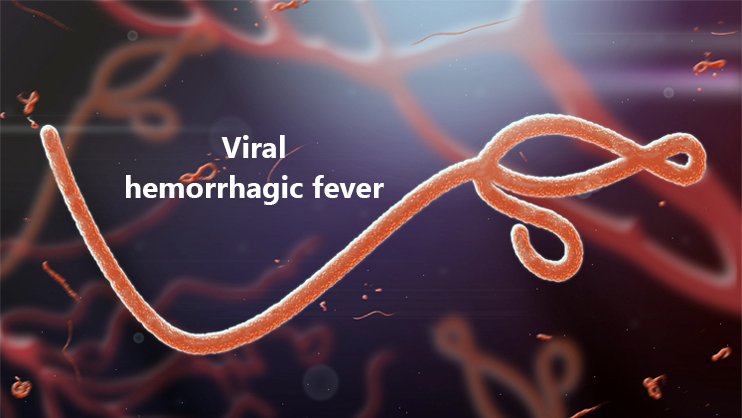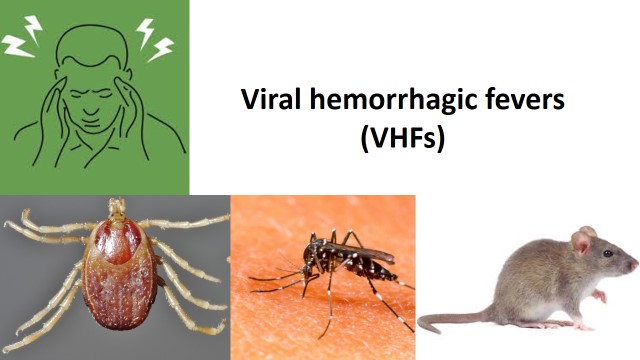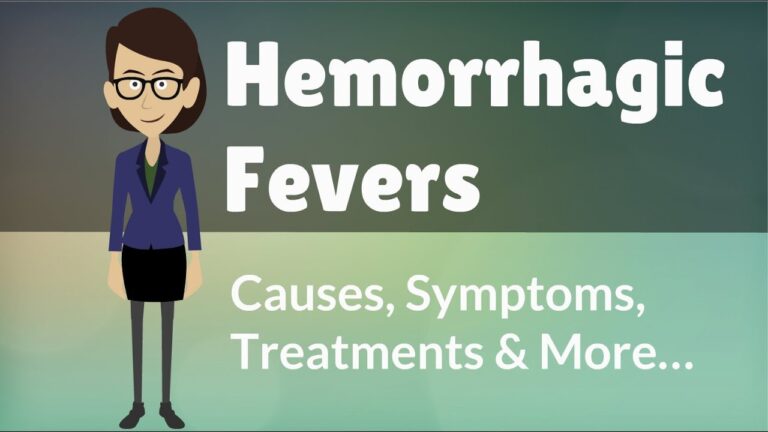VIRAL HEMORRHAGIC FEVERS – SYMPTOMS, CAUSES, AND TREATMENT
Viral hemorrhagic fevers are infectious diseases that could cause severe, life-threatening diseases. They could damage the walls of tiny blood vessels, making them leak, and could hamper the blood’s ability to clot. The resulting internal bleeding is generally not life-threatening, but the diseases could be.

Some viral hemorrhagic fevers include:
- Dengue
- Ebola
- Lassa
- Marburg
- Yellow fever
These diseases most commonly happen in tropical areas. In the United States, people who get them generally have recently traveled to one of those areas.
There is no cure for viral hemorrhagic fevers. There are vaccines for only some types. Unless more vaccines are developed, the most effective approach is prevention.
SYMPTOMS
Signs and symptoms of viral hemorrhagic fevers differ by disease. In general, early signs and symptoms could include:
- Fever
- Fatigue, weakness, or a general feeling of being not well
- Dizziness
- Muscle, bone, or joint aches
- Nausea and vomiting
- Diarrhea
Symptoms that can become life-threatening
More-severe symptoms include:
- Bleeding underneath the skin, in internal organs, or from the mouth, eyes, or ears
- Nervous system malfunctions
- Coma
- Delirium
- Kidney failure
- Respiratory failure
- Liver failure
WHEN SHOULD YOU SEE A DOCTOR?
The best time to see a doctor is before you travel to a developing country to make sure that you have received any available vaccinations and pre-travel advice for staying healthy.
If you develop signs and symptoms once you return home, speak to a doctor, preferably one trained in international medicine or infectious diseases. Tell your doctor where you have traveled.
CAUSES
Viral hemorrhagic fevers are spread through contact with infected animals or insects. The viruses that cause viral hemorrhagic fevers reside in a variety of animal and insect hosts. Most commonly the hosts are mosquitoes, ticks, rodents, or bats.
Some viral hemorrhagic fevers could also be spread from person to person.

How is it transmitted?
Some viral hemorrhagic fevers are spread through mosquito or tick bites. Others are spread by contact with infected body fluids, like blood, saliva, or semen. A few varieties could be inhaled from infected rat feces or urine.
If you travel to an area where a particular hemorrhagic fever is common, you could be infected there but not develop symptoms until after you return home. Depending on the type of virus, it could take from two to 21 days for symptoms to develop.
RISK FACTORS
Living in or traveling to a region where a particular viral hemorrhagic fever is common will increase your risk of becoming infected with that specific virus. Additional factors that could increase your risk are:
- Working with infected people
- Slaughtering or eating infected animals
- Sharing needles to use intravenous drugs
- Having unprotected sex
- Working outdoors or in rat-infested buildings
- Being exposed to infected blood or other infected bodily fluids
COMPLICATIONS
Viral hemorrhagic fevers could cause:
- Septic shock
- Multiorgan failure
- Death
PREVENTION
Preventing viral hemorrhagic fevers is difficult. If you live in, work in, or travel to regions where these diseases are common, protect yourself from infection by using appropriate protective barriers when working with blood or body fluids. For instance, wear gloves and eye and face shields. Precautions also include careful handling, disinfection, and disposal of laboratory samples and waste.
Get vaccinated
The yellow fever vaccine is usually considered safe and effective. However, in rare cases, severe side effects can occur. The yellow fever vaccine is not recommended for children younger than nine months of age; pregnant women, particularly during the first trimester; or people with compromised immune systems.
In addition, there is an Ebola vaccination that protects against one type of Ebola. Check with the Centers for Disease Control and Prevention about the status of the countries you are visiting — some need certificates of vaccination for entry.
Avoid mosquitoes and ticks
Do your best to avoid these insects, particularly when traveling in areas where there are outbreaks of viral hemorrhagic fevers. Wear light-colored long pants and long-sleeved shirts or, best of all, permethrin-coated clothing. Do not apply permethrin directly onto your skin.
Avoid being outside, if possible, at dusk and dawn when mosquitoes are most active, and apply mosquito repellent with a 20 percent to 25 percent concentration of DEET to your skin and clothing. If you are staying in tented camps or in hotels, use bed nets, and mosquito coils.
Guard against rodents
If you live where there are outbreaks of viral hemorrhagic fevers, take measures to keep rodents out of your home:
- Keep the pet food covered and stored in rodent-proof containers.
- Store trash in rodent-proof containers, and clean the containers frequently.
- Dispose of garbage regularly.
- Ensure doors and windows have tightfitting screens.
- Keep woodpiles, stacks of bricks, and other materials at least a hundred feet from your house.
- Mow your grass closely and keep brush trimmed to within a hundred feet of your house.

DIAGNOSIS
Diagnosing specific viral hemorrhagic fevers in the first few days of disease could be difficult because the early signs and symptoms — high fever, muscle aches, headaches, and extreme fatigue — are common to many other diseases.
To help with diagnosis, inform your doctor about your medical and travel history and your exposure to rodents or mosquitoes. Include the countries you visited and the dates, as well as any contact you may have had with possible infection sources.
Laboratory tests, usually using a blood sample, are required to confirm a diagnosis. Because viral hemorrhagic fevers are particularly infectious and contagious, these tests are generally performed in specially designated labs using strict precautions.
TREATMENT
There is no cure for viral hemorrhagic fevers. Vaccinations exist for only some types. The most effective approach is prevention. Supportive care is the key to treatment.
Medications
While no specific treatment exists for most viral hemorrhagic fevers, the antiviral drug ribavirin (Rebetol, Virazole) may shorten the course of some infections and prevent complications in some people. Other medications are under development.
Therapy
Supportive care is crucial. To prevent dehydration, you may require fluids to help maintain your balance of electrolytes — minerals that are critical to nerve and muscle function.
Surgical and other procedures
Some people may benefit from kidney dialysis, which removes wastes from your blood when your kidneys fail.
If you or anyone you know is suffering from viral hemorrhagic fevers, our expert providers at Specialty Care Clinics will take care of your health and help you recover.
Call us on (469) 545-9983 to book an appointment with our specialists.
